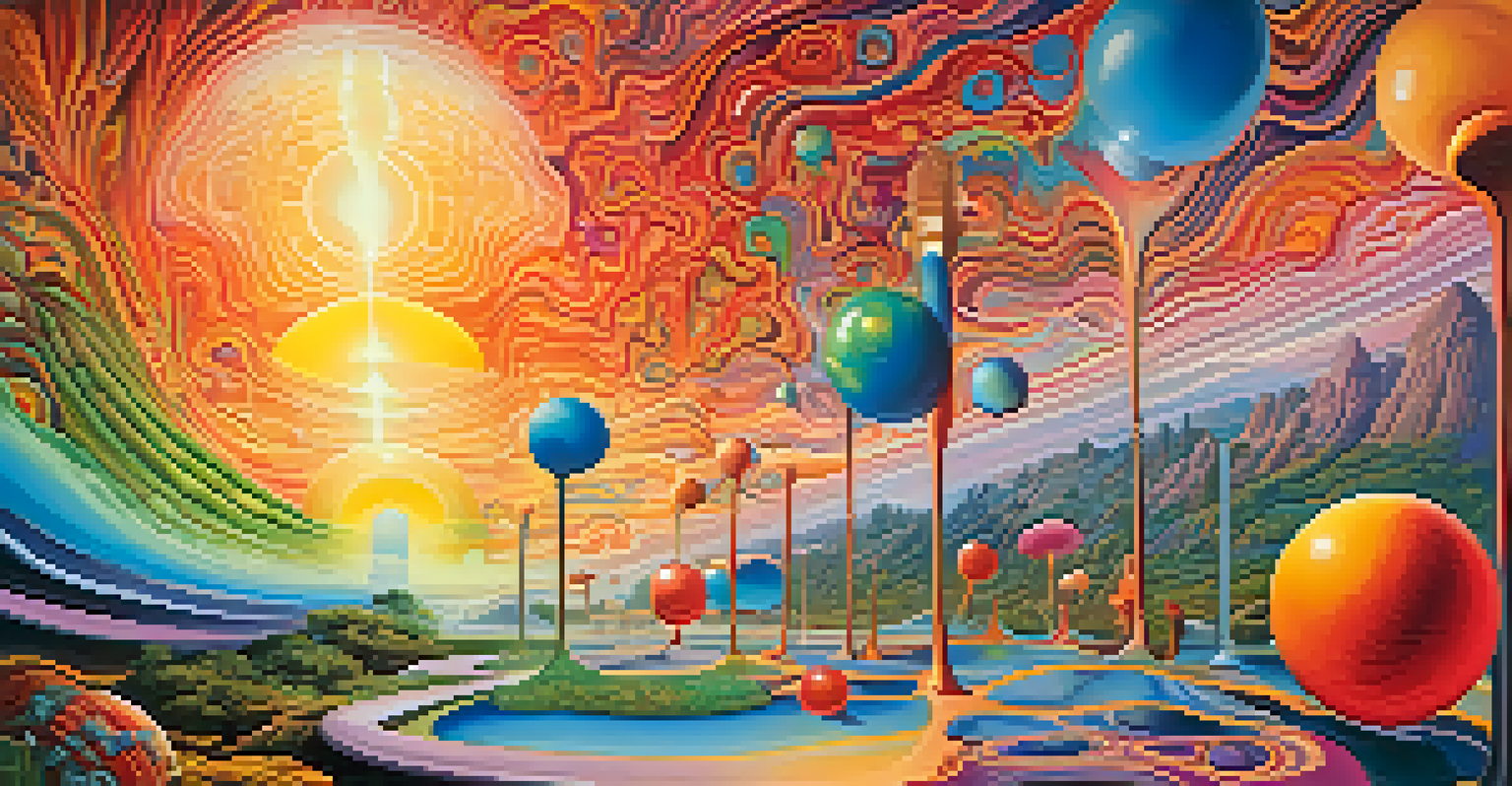Altered States of Consciousness: The Role of Brain Chemistry

Understanding Altered States of Consciousness
Altered states of consciousness (ASC) refer to mental states that differ significantly from the normal waking state. These can be induced by various factors, including meditation, sleep, drugs, or intense emotions. Essentially, ASCs can change our perception, thoughts, and feelings, leading to experiences that feel profoundly different from our everyday lives.
The mind is everything. What you think you become.
For instance, when people meditate deeply, they often report feelings of oneness with the universe or heightened awareness. Similarly, psychedelics can create vivid hallucinations and altered perceptions of time and space. Understanding ASCs is crucial because they can provide insights into the workings of the human mind and our perception of reality.
Moreover, the study of ASCs has applications in therapy, creativity, and even spirituality. By exploring these altered states, researchers are uncovering the brain's potential to experience reality in diverse ways, which can lead to personal growth and healing.
The Chemistry of the Brain: An Overview
The brain operates using a complex network of neurotransmitters, chemicals that transmit signals between neurons. These neurotransmitters, such as dopamine, serotonin, and gamma-aminobutyric acid (GABA), play crucial roles in regulating mood, perception, and various cognitive functions. Their balance is essential for maintaining a stable mental state.

For example, dopamine is often associated with pleasure and reward, while serotonin contributes to feelings of well-being and happiness. When these chemicals fluctuate, they can lead to altered perceptions and emotional states. Understanding this chemistry helps us decipher how different experiences can shift our consciousness.
ASCs Transform Our Perception
Altered states of consciousness (ASCs) can significantly change how we perceive reality, influenced by factors like meditation, drugs, and emotions.
In essence, brain chemistry is like a finely tuned orchestra, where each neurotransmitter plays its part to create a harmonious mental experience. When one section is out of tune, it can lead to dissonance, or in psychological terms, an altered state of consciousness.
How Neurotransmitters Affect Consciousness
Neurotransmitters are pivotal in determining our mental states and can induce ASCs when their levels change. For instance, increased levels of serotonin can lead to feelings of happiness and contentment, whereas its depletion may cause sadness or depression. Similarly, the release of endorphins during exercise can create a euphoric 'runner's high', a mild altered state.
We are not human beings having a spiritual experience; we are spiritual beings having a human experience.
Psychoactive substances also manipulate neurotransmitter levels to create profound changes in consciousness. For example, LSD primarily affects serotonin receptors, leading to alterations in perception, mood, and thought. These changes can be so significant that they challenge our understanding of reality and self.
Thus, the interplay between neurotransmitters and consciousness illustrates the delicate balance required for mental well-being. When we understand these dynamics, we can better appreciate the experiences that shape our perceptions and realities.
Psychedelics and Altered States of Consciousness
Psychedelic substances, such as LSD, psilocybin, and ayahuasca, have gained attention for their ability to induce profound altered states of consciousness. These substances work primarily by influencing serotonin receptors in the brain, leading to vivid visual and auditory hallucinations. Users often report experiences of interconnectedness, transcendence, and deep emotional insights.
Interestingly, recent research has shown potential therapeutic benefits of psychedelics in treating conditions like depression, PTSD, and anxiety. By temporarily altering consciousness, these substances can provide new perspectives on personal issues and traumas, facilitating healing and growth.
Neurotransmitters Shape Our Minds
The balance of neurotransmitters in the brain, such as serotonin and dopamine, is crucial for regulating our mood and consciousness.
However, it's essential to approach psychedelics with caution and respect. Their powerful effects can be unpredictable, and not everyone may have a positive experience. Understanding the brain chemistry behind these substances can help us navigate their use more safely and effectively.
Meditation: A Natural Path to Altered States
Meditation is another pathway to altered states of consciousness that doesn't involve substances. Through techniques like mindfulness or transcendental meditation, individuals can achieve deep relaxation and heightened awareness. This practice has been shown to alter brain chemistry by increasing levels of gamma-aminobutyric acid (GABA), which helps reduce anxiety and promotes calmness.
Many meditators report experiences similar to those induced by psychedelics, such as feelings of unity or profound peace. These experiences highlight how our brain chemistry can change through intentional practices, leading to altered states that foster personal insight and emotional well-being.
Furthermore, meditation can enhance cognitive functions and emotional regulation over time, illustrating its long-term benefits. By understanding the brain's response to such practices, we can better appreciate the transformative power of meditation.
The Role of Sleep in Consciousness Alteration
Sleep is a fundamental state of consciousness that plays a critical role in our overall health and well-being. During sleep, especially in REM (rapid eye movement) sleep, the brain processes emotions and memories, leading to vivid dreams. These dreams can be viewed as a form of altered consciousness, offering insights into our subconscious mind.
Sleep deprivation, on the other hand, can lead to altered states characterized by confusion, hallucinations, and irritability. This demonstrates how essential sleep is for maintaining mental clarity and emotional stability. The brain's chemistry changes during sleep, with fluctuations in neurotransmitters like serotonin and norepinephrine that impact mood and cognitive function.
Therapeutic Potential of Psychedelics
Psychedelics have shown promise in treating mental health conditions by inducing ASCs that can offer new perspectives and facilitate healing.
Therefore, ensuring quality sleep is crucial for optimal brain chemistry and consciousness. By valuing sleep, we can harness its power to support our mental health and enhance our overall experience of life.
Conclusion: The Interconnectedness of Mind and Chemistry
The exploration of altered states of consciousness reveals the intricate relationship between our brain chemistry and mental experiences. From meditation to psychedelics and sleep, various factors can shift our consciousness, often through the manipulation of neurotransmitter levels. This interconnectedness highlights the complexity of the human mind and its capacity for diverse experiences.
Understanding these dynamics not only enhances our knowledge of psychology but also offers pathways for therapeutic interventions and personal growth. By exploring altered states, we can gain deeper insights into our emotions, behaviors, and ultimately, ourselves.

In conclusion, the study of altered states of consciousness and brain chemistry underscores the richness of human experience. By appreciating this connection, we open doors to greater self-awareness, healing, and understanding of our place within the world.